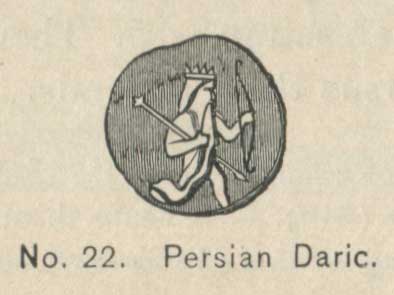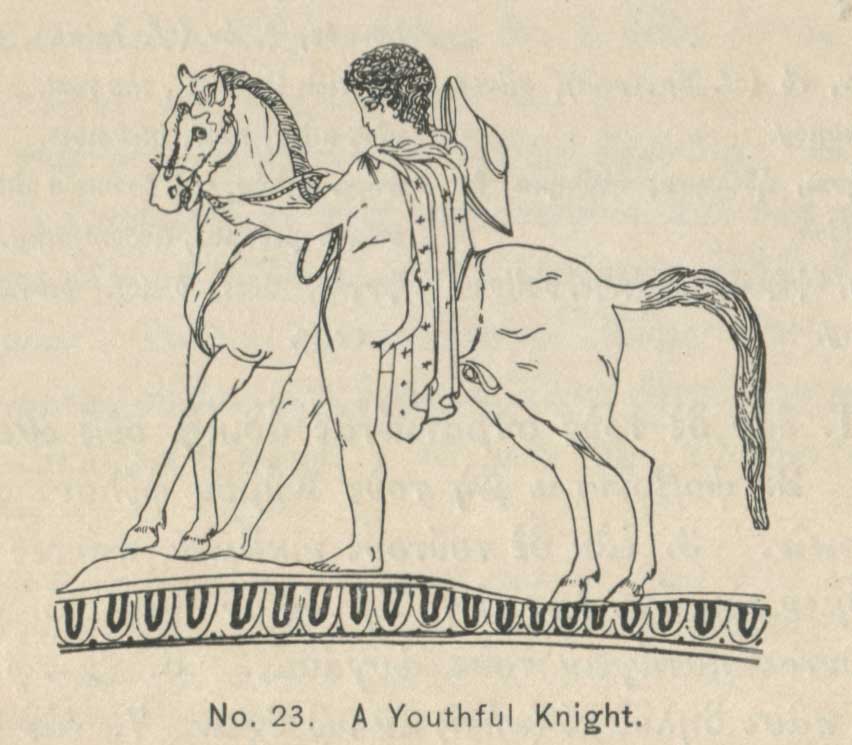THE FIRST GREEK BOOK
BY JOHN WILLIAMS WHITE, PH.D, LL.D., LITT.D.
Professor Of Ancient Greek At Harvard University
This Revision Copyright ©2012 by Shawn Irwin
XXXIV - Subjunctive Middle and Passive, Subjunctive after Verbs of Fearing
S331. Learn the conjugation of the subjunctive middle and passive of λύω
in 765 (λύωμαι), 767 (λύσωμαι), 769 (λελυμένος ὦ),
and 770 (λυθῶ).
S332. The long vowel ω or η (315) is used also in the middle and
passive in all the tenses. But in the aorist passive it is added to the tense stem (195), as λύθε-ω, λυθῶ
(by contraction). The subjunctive uses the endings of the primary tenses (315), here the middle and passive endings (175),
except in the aorist passive where the active ending occur (136).
S333.
1. δεδοίκα μὴ τὰς γεφύρᾱς λύωσι, I fear that they will destroy the bridges.
2. δεδοίκαμεν μὴ οὐ πιστοὶ ἦτε, we fear that you will not be faithful.
The subordinate clause, which expresses the thing feared and is the object of the leading verb,
takes the subjunctive; it is introduced by μή, that or lest (Latin ne), or if negative by μὴ οὐ that
not (Latin ut). The verb which denotes fear is in the primary tense.
S334. After verbs denoting fear, caution, or danger, μή, that or
lest, takes the subjunctive after primary tenses. The negative form is μὴ οὐ.

S335. Vocabulary.
δέδοικα, a perfect with force of present, aorist, ἔδεισα, (compare
δεινός), fear, of reasonable fear.
διασπάω, draw apart, separate.
ἑξαπατάω, ἐξαπατήσω, etc., deceive grossly, mislead.
ἑπικίνδῡνος, ον, (compare κινδῡνος), dangerous, perilous.
κίνδῡνος, ου, ὁ, danger, peril.
νομίζω, (νομιδ), νομιῶ, etc., regard, consider, think.
σπάω, ἔσπασα, ἔσπακα, ἔσπασμαι, ἐσπάσθην, draw.
σχολή, ῆς, ἡ, leisure; σχολῇ, slowly.
φοβέω, φοβήσω, ἐφόβησα, (compare φόβος, φοβερός
), frighten; commonly passive deponent, be frightened, fear of unreasoning fear.
S336.
1. παυσώμεθα, ὦ φίλοι, ταύτης τῆς μάχης.
Note: A genitive of separation (849).
2. σχολῇ πορεύονται ἵνα μὴ ἡ φάλαγξ διασπασθῇ.
A dative of manner (866).
3. Κῦρος τὸν σατράπην φίλον οὐ νομιεῖ,
ἐὰν ἐπὶ τὴν ἀρχὴν πορεύηται ἐκεῖνος.
Α predicate accusative (840).
νομιεῖ future third singular.
4. βοῶσι πάντες, ἵνα οἱ πολέμιοι ἐξαπατηθῶσι.
5. φοβοῦνται γὰρ μὴ οὐ ὁ σατράπης τοῦ πολέμου παύηται.
6. ἤν δὲ ἡ γέφῡρα λύθῇ, οἱ πολέμιοι ἀποχωρήσουσι.
7. ἡ δὲ χώρᾱ πολεμίᾱ ἐστίν˙ ἐπικίνδῡνοn οὖν ἔσται ἐὰν πορεύησθε δι᾽ αὐτῆς.
Third singular of the future (ἔσομαι) of εἰμί (for ἔσεται).
8. δέδοικα μὴ σπάσηται τὸν ἀκῑνάκην.
9. κίνδῡνος ἐστι μὴ τῆς νυκτὸς οἱ πολέμιοι πορεύωνται ἐπ᾽ αὐτούς.
S337.
1. I fear that the satrap will be sent.
2. Let us deliberate about this.
3. We will destroy the bridge, that the enemy may not send for the peltasts.
4. I do not fear that this man will be made a satrap.
Use the aorist.
5. There is no danger that Cyrus will wish to pursue these generals.
S338. Advance to the Euphrates
μετὰ ταῦτα Κῦρος ἐξελαύνι παρασάγγᾱς εἴκοσιν ἐπὶ τὸν Χάλον
ποταμόν. ἐνῆσαν δὲ ἐν τῷ ποταμῷ ἰχθύες, οὓς (which) οἱ Σύροι
θεοὺς ἐνόμιζον καὶ ἀδικεῖν οὐκ εἴων. ἐσκήνουν δὲ οἱ στρατιῶται
ἐν ταῖς Παρυσάτιδος κώμαις. ἐνταῦθα ἐξελαύνει ἐπὶ τὰς πηγὰς
τοῦ Δάρδατος ποταμοῦ. ἐνταῦθα ἦσαν βασίλεια καὶ παράδεισος
καλός. Κῦρος δ᾽ αὐτὸν ἐκκόπτει καὶ τὰ βασίλεια κατακάει.
ἐντεῦθεν ἐξελαύνει σταθμοὺς τρεῖς ἐπὶ τὸν εὐφράτην ποταμόν.
ἰχθύες: fish, nominative plural of ἰχθύς, ύος, ὁ.
οὐκ εἴων: i.e. they permitted nobody.
Παρυσάτιδος: the mother of Cyrus. The income from these villages supplied her with "pin money."
αὐτόν: the park.

See the route on the map.
End Of Chapter
INDEX
Chapter 35
HOME
This Revision Copyright ©2012 by Shawn Irwin

